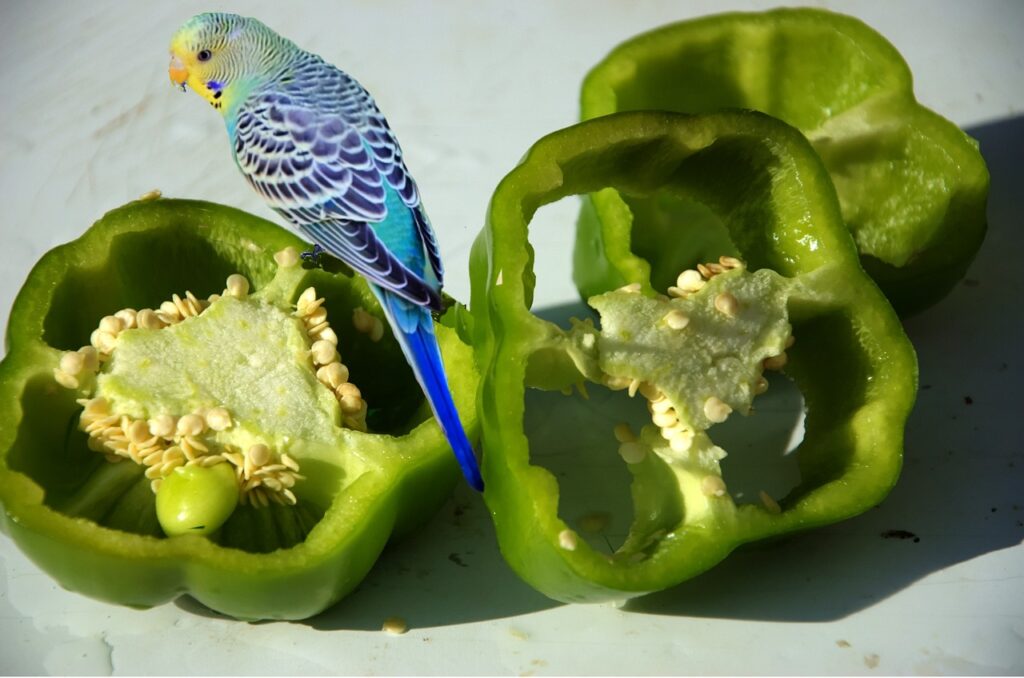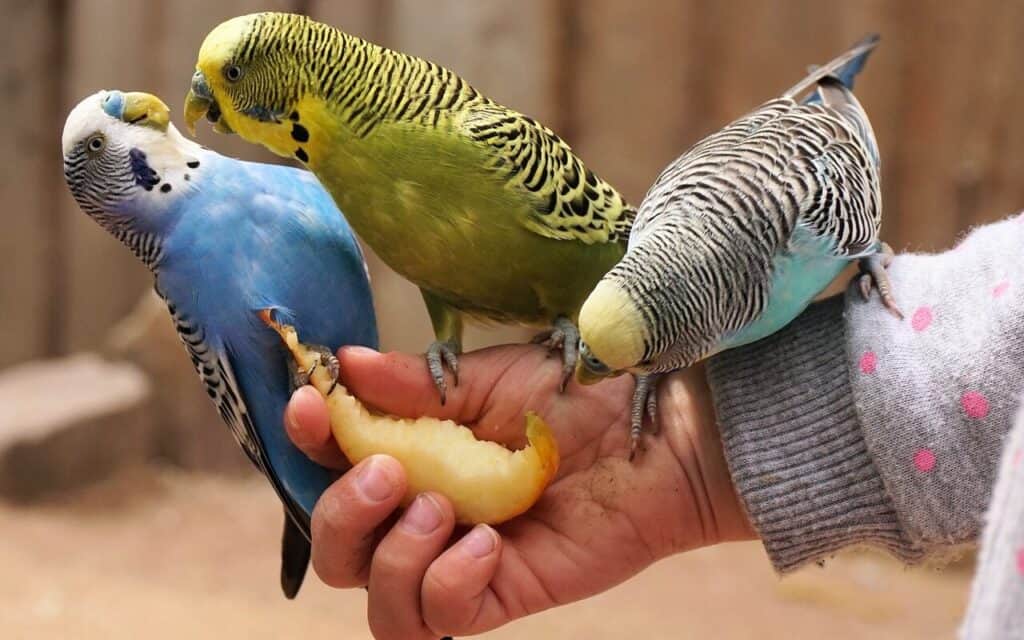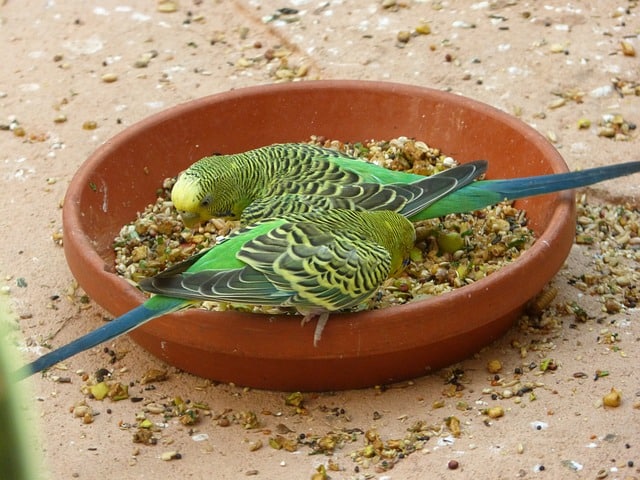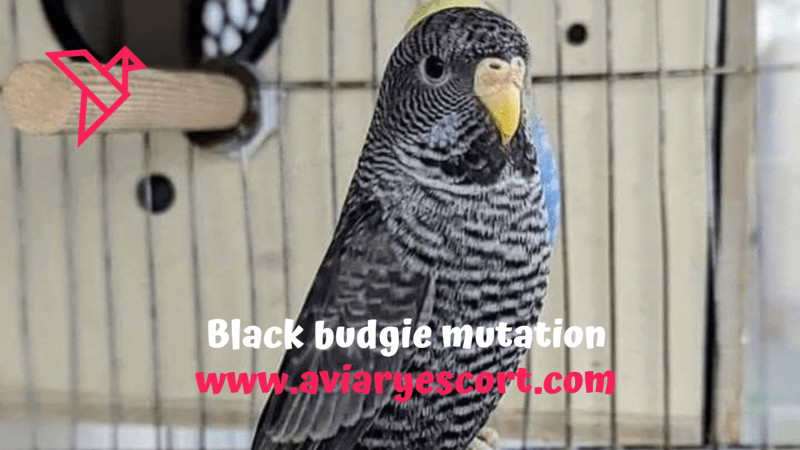Budgies, cherished for their vibrant plumage and playful demeanor, require more than just seeds to thrive as pets. A key factor in ensuring their well-being lies in understanding and catering to their dietary needs. A balanced diet, rich in essential nutrients, is paramount for the overall health of these feathered companions. In this comprehensive guide, we’ll delve into the world of vegetables and unveil the array of options that can enhance the nutritional profile of your budgie’s diet. From exploring safe and nutrient-rich choices to addressing common challenges, join us on a journey to discover the secrets of providing a wholesome vegetable-based diet for your beloved budgies.
How to add Vegetables in Budgie’s Diet?
When it comes to incorporating vegetables into your budgie’s diet, proper preparation is essential to ensure their health and that budgies do like and eat them. Here are some crucial tips to follow when preparing vegetables for your feathered friends:
1. Proper Washing and Cleaning:
Before serving any vegetables to your budgies, it’s crucial to thoroughly wash and clean them to remove any pesticides, dirt, or contaminants. Rinse the vegetables under running water and use a brush to scrub away any residue. Consider using organic produce when possible to minimize the risk of harmful chemicals.
2. Ideal Serving Sizes for Budgies:
While vegetables are a nutritious addition to a budgie’s diet, it’s important to provide them in appropriate serving sizes. Budgies have small beaks and can struggle with large pieces of food. Chop vegetables into bite-sized pieces to make it easier for them to consume. Additionally, start with small portions to gauge your budgie’s preferences and digestive tolerance.
3. Creative Ways to Serve Vegetables:
Encourage your budgie to explore and enjoy vegetables by presenting them in creative ways. Consider threading small vegetable pieces onto a skewer or placing them in a foraging toy. This not only makes the dining experience more engaging for your budgie but also stimulates their natural foraging instincts.
Another creative option is to finely chop or grate vegetables and mix them with your budgie’s regular food. This method ensures that they get a taste of the vegetables without feeling overwhelmed by large chunks. Experiment with different vegetable combinations to discover your budgie’s favorite mix.
For a more interactive approach, try hiding vegetable pieces in various areas of the cage or attaching them to different perches. This not only adds an element of fun to mealtime but also provides mental stimulation for your budgie.
Here is the list of 20 safe and healthy vegetables for your budgies.
1. Can Budgies Eat Kale?
Kale is a nutrient powerhouse for budgies, providing an excellent source of vitamins A, C, and K. These vitamins play a crucial role in supporting the immune system, promoting healthy skin and feathers, and aiding in proper blood clotting. Additionally, kale contains essential minerals like calcium, contributing to strong bones and overall well-being. Introduce kale in moderation, finely chopped or shredded, to ensure your budgie can easily consume this leafy green and benefit from its nutritional goodness.
2. Can Budgies Eat Spinach?
Spinach is a beneficial addition to your budgie’s diet, offering a rich source of iron, fiber, and antioxidants. Iron is vital for preventing anemia, while fiber supports digestive health. The antioxidants found in spinach contribute to overall cell protection. Serve spinach in small, manageable portions, and consider rotating it with other greens to provide a diverse range of nutrients for your budgie’s optimal health.
Avoid feeding spinach in large quantity as it can cause health problems.
3. Can Budgies Eat Bell Peppers?
Colorful bell peppers are not only visually appealing but also provide a vitamin C boost for your budgie. Vitamin C is essential for the development and maintenance of connective tissues and helps support a strong immune system. Slice bell peppers into bite-sized pieces, ensuring they are free of seeds and pith, to offer a crunchy and nutritious treat that your budgie will likely enjoy.
4. Can Budgies Eat Carrots?
Carrots are a well-loved vegetable among budgies, offering a rich source of beta-carotene, which converts to vitamin A. Vitamin A is crucial for maintaining healthy eyes, skin, and feathers. Grate or chop carrots into small, manageable portions to make it easier for your budgie to consume and enjoy the nutritional benefits of this vibrant orange vegetable.

5. Can Budgies Eat Broccoli?
Broccoli is a nutrient-dense cruciferous vegetable that provides vitamins, minerals, and fiber. It is rich in vitamin C, which supports the immune system, and contains folate, contributing to overall health. Serve broccoli in small florets, ensuring they are appropriately sized for your budgie to nibble on and enjoy the nutritional goodness of this green vegetable.
6. Can Budgies Eat Zucchini?
Zucchini, with its mild flavor and high water content, is a hydrating and nutritious vegetable for budgies. It offers essential vitamins and minerals, including vitamin C and potassium. Slice or dice zucchini into small, manageable portions, and introduce it gradually to see if your budgie takes to this refreshing addition to their diet.
7. Can Budgies Eat Cucumber?
Cucumber is a hydrating and low-calorie vegetable that budgies can appreciate. It provides a refreshing crunch and is a good source of hydration. Slice or dice cucumber into small pieces, ensuring they are easy for your budgie to handle. While cucumber may not be as nutrient-dense as some other vegetables, it can be a delightful and hydrating treat for your feathered friend.
8. Can Budgies Eat Cauliflower?
Cauliflower is a versatile and nutritious cruciferous vegetable that budgies can enjoy. It provides a good source of vitamins C and K, as well as folate. Offer small, bite-sized florets to introduce variety to your budgie’s diet and contribute to their overall health.
9. Can Budgies Eat Sweet Potatoes?
Sweet potatoes are a nutritious and tasty addition to your budgie’s vegetable options. Packed with beta-carotene, vitamins A and C, and fiber, sweet potatoes support vision, immune function, and digestion. Cook and mash them or offer small, cooked slices for a delicious and nutrient-rich treat.
10. Can Budgies Eat Peas?
Peas are a great source of protein, fiber, and essential vitamins for budgies. They provide energy and contribute to overall digestive health. Offer fresh or thawed frozen peas in small amounts, either individually or mixed with other veggies, to provide a delightful burst of flavor and nutrition.
11. Can Budgies Eat Cabbage?
Cabbage, another member of the cruciferous family, is rich in vitamins and antioxidants. It provides vitamin C and K, supporting the immune system and bone health. Offer finely shredded cabbage in moderation to introduce a crisp and nutritious element to your budgie’s diet.
12. Can Budgies Eat Asparagus?
Asparagus is a nutrient-packed vegetable containing vitamins A, C, and K, as well as folate. It contributes to overall health and provides antioxidants. Trim asparagus into small pieces and offer them as a crunchy and flavorful addition to diversify your budgie’s vegetable choices.
13. Can Budgies Eat Radishes?
Radishes add a zesty and crunchy component to your budgie’s diet. They provide vitamin C, fiber, and antioxidants. Slice radishes into small, manageable pieces and offer them as a tasty and nutritious snack that can stimulate your budgie’s taste buds.
14. Can Budgies Eat Pumpkin?
Pumpkin is a nutritious and hydrating vegetable rich in beta-carotene, supporting vision and immune health. Cook and mash or offer small, cooked pumpkin cubes to provide a flavorful and beneficial addition to your budgie’s diet. Pumpkin seeds can also be offered as a tasty treat, but in moderation due to their fat content.
15. Can Budgies Eat Brussels Sprouts?
Brussels sprouts are a compact cruciferous vegetable rich in vitamins C and K, as well as fiber. While not all budgies may take to their slightly bitter taste, offering finely chopped or cooked Brussels sprouts in small amounts can introduce additional nutrients to their diet.
16. Can Budgies Eat Celery?
Celery is a low-calorie, hydrating vegetable that adds a satisfying crunch to your budgie’s diet. It contains vitamins A, K, and C, along with antioxidants. Chop celery into small, manageable pieces, making it an enjoyable and refreshing treat for your feathered friend.

17. Can Budgies Eat Beets?
Beets provide a natural sweetness and are packed with essential nutrients, including folate, manganese, and fiber. Offer small, cooked beet slices or grated beets as a colorful and nutritious addition to diversify your budgie’s vegetable choices.
18. Can Budgies Eat Radicchio?
Radicchio, a member of the chicory family, offers a slightly bitter flavor and vibrant color. It provides vitamins and minerals, including vitamin K and antioxidants. Introduce radicchio in small amounts to see if your budgie enjoys this unique addition to their diet.
19. Can Budgies Eat Corn?
Corn kernels can be a tasty and energy-rich addition to your budgie’s diet. While high in carbohydrates, they also provide fiber and essential nutrients. Offer fresh or cooked corn kernels in moderation to add variety to your budgie’s culinary experience.
20. Can Budgies Eat Swiss Chard?
Swiss chard is a leafy green vegetable rich in vitamins A, C, and K, as well as iron and magnesium. Offer finely chopped or cooked Swiss chard leaves to provide a nutritious and flavorful option for your budgie’s well-rounded diet.
Harmful Vegetables to Avoid for Budgies
While vegetables are generally a healthy addition to budgie’s diet, it’s essential to be aware of potentially harmful options. Some vegetables can be harmful to budgies due to their composition or certain substances that may be toxic to these small birds. In this section, we’ll highlight seven vegetables to avoid when feeding your budgie.
1. Can Budgies Eat Avocado?
Avocado contains a substance called persin, which is toxic to birds. Consumption of avocado can lead to respiratory distress, lethargy, and in severe cases, it may be fatal for budgies.
2. Can Budgies Eat Onions?
Onions, whether raw or cooked, can be harmful to budgies as they contain compounds that can damage their red blood cells. This may lead to anemia and other health issues.
3. Can Budgies Eat Garlic?
Similar to onions, garlic also contains substances that can be harmful to budgies. It can cause digestive problems and may negatively impact their overall health.
4. Can Budgies Eat Mushrooms?
While some mushrooms are safe for birds, it’s best to avoid offering them to budgies unless you are certain about the specific type. Certain mushrooms can be toxic and lead to serious health problems.
5. Can Budgies Eat Potatoes?
Raw potatoes and potato sprouts contain solanine, a toxic substance harmful to budgies. Cooking may reduce the solanine content, but it’s still safer to avoid feeding them potatoes altogether.
6. Can Budgies Eat Tomato Leaves and Stems?
While the flesh of ripe tomatoes is generally safe, the leaves and stems contain tomatine, which can be harmful to budgies. It’s advisable to remove these parts before offering tomatoes to your feathered friends.
7. Can Budgies Eat Rhubarb?
Rhubarb contains oxalic acid, which can be toxic to budgies and cause digestive issues. As recommended by the VCA Hospitals, avoid giving them any part of the rhubarb plant.
Factors to Consider When Introducing Vegetables to Budgies
- Gradual Introduction: Introduce vegetables gradually, allowing budgies to adjust to new flavors and textures over time.
- Variety is Key: Offer a diverse range of vegetables to ensure a balanced diet and provide a mix of vitamins and minerals.
- Freshness Matters: Choose fresh, high-quality vegetables, and wash them thoroughly to remove any pesticides or contaminants.
- Remove Harmful Parts: For certain vegetables like tomatoes and eggplants, remove leaves, stems, and seeds to eliminate potentially harmful substances.
- Moderation is Crucial: While vegetables are healthy, moderation is key. Avoid overfeeding to prevent digestive issues.
- Observe Reactions: Monitor your budgies for any signs of discomfort or allergies when introducing new vegetables. Discontinue any veggie causing adverse reactions.
- Consult with a Vet: Seek advice from a veterinarian to tailor the vegetable intake based on your budgie’s specific health needs.
- Chop Into Bite-Sized Pieces: Cut vegetables into small, manageable pieces to make it easier for budgies to eat and reduce the risk of choking.
- Rotate Choices: Rotate vegetable choices to keep the diet interesting and ensure a wide array of nutrients.
- Avoid Seasonings: Do not add any seasonings, salt, or spices to the vegetables offered to budgies. Keep it simple and natural.
- Supplement with Pellets: While vegetables are beneficial, ensure that the budgies’ primary diet includes high-quality pellets to meet their nutritional requirements.
Expanding your budgie’s diet with a variety of safe vegetables can contribute to their overall health and well-being. Always monitor their reactions to new foods and consult with a veterinarian for personalized dietary advice.
Frequently Asked Questions
Q: How do I encourage my budgie to eat vegetables if they seem uninterested?
A: Start by finely chopping or grating vegetables and mixing them with your budgie’s regular food. Gradually increase the amount of vegetables over time. Offering a variety and being consistent can encourage acceptance.
Q: Can I feed my budgie raw vegetables, or do they need to be cooked?
A: Budgies can eat both raw and cooked vegetables. Some birds may prefer one form over the other. Ensure that cooked vegetables are plain and not seasoned. Be cautious with cooking methods, avoiding excessive oils or seasonings.
Q: Are there specific vegetables that provide more nutritional benefits to budgies?
A: Dark, leafy greens like kale and spinach, along with vegetables high in beta-carotene like carrots, offer valuable nutrients. Bell peppers, broccoli, and sweet potatoes are also excellent choices. Always ensure they are fresh and thoroughly washed.
Q: Can budgies eat vegetables every day, and how much is appropriate?
A: Yes, budgies can eat vegetables daily as part of a balanced diet. Introduce them gradually, and aim for a mix of colors and types to provide a diverse range of nutrients. The amount will depend on your budgie’s size and preferences but generally constitutes around 10-15% of their total diet.












